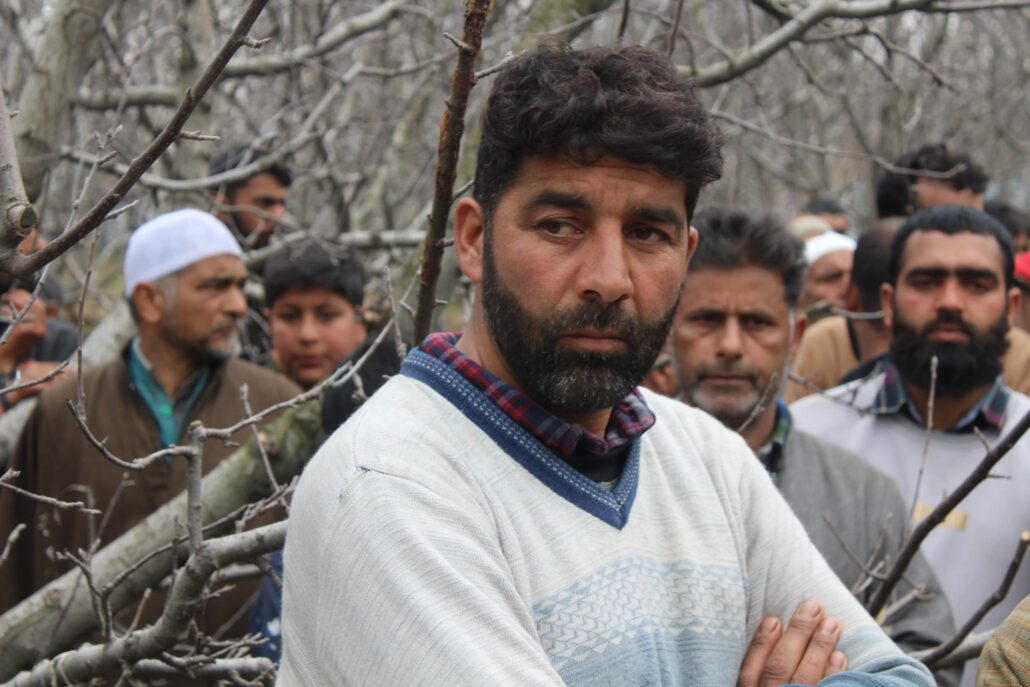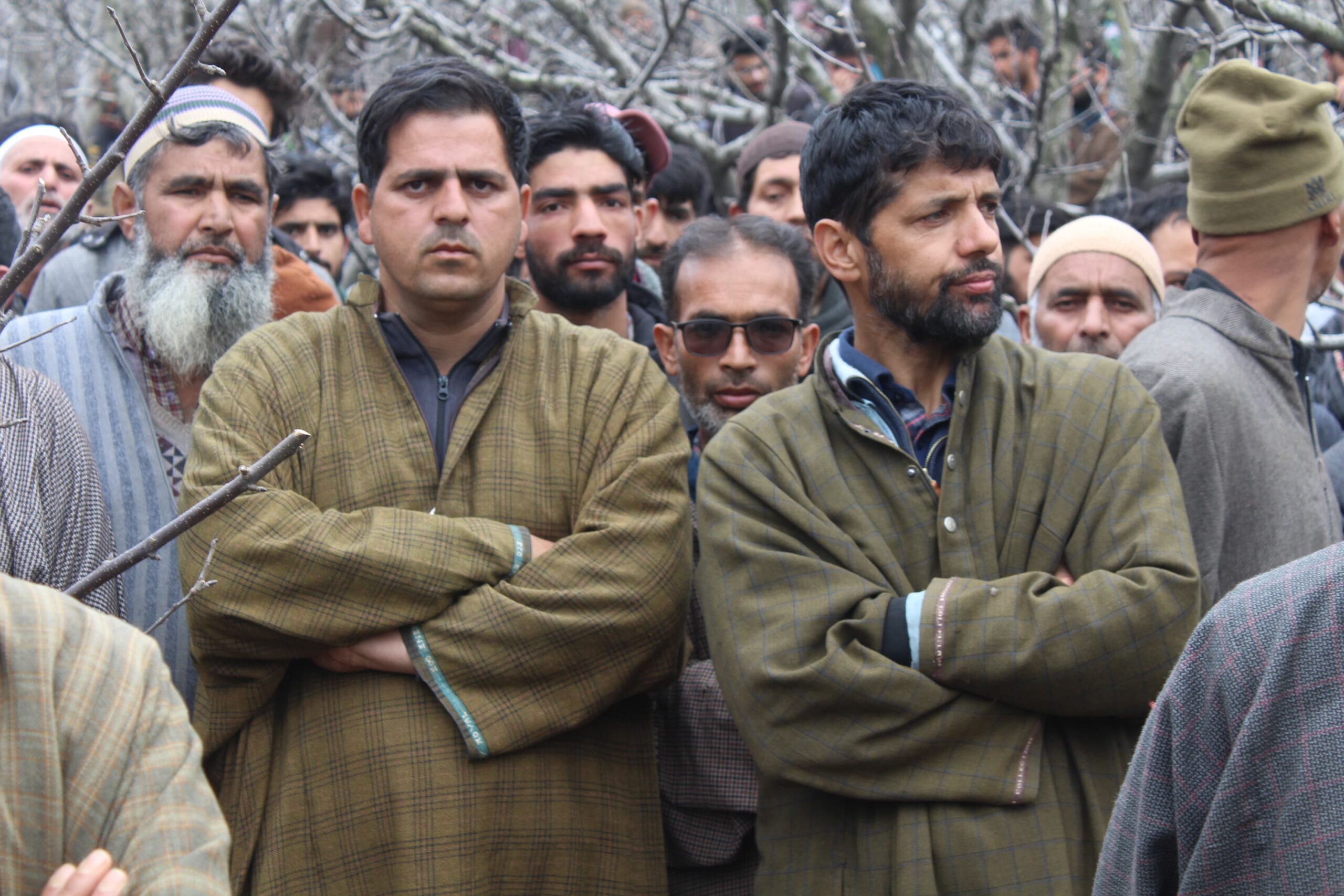
Sibte Abdullah/ Boidurjya Singha
Bashir Ahmed Bhat was working in his apple orchard when he observed an uncommon exercise round his farm. The 56-year-old farmer went near the intruders and observed, a staff of officers surveying the realm. “I used to be knowledgeable that the federal government is taking our wind up for an important railway line undertaking,” mentioned Bashir Ahmed, a resident of Reshipora space in Zainapora, almost twenty kilometers away from the district headquarters of the south Kashmir district of Shopian.
Kashmir is world well-known for its picturesque magnificence. The apples of the areas are equally famend. The fears of farmers like Bashir are triggered by the current sanction of 5 railway strains via the valley. One among these strains, the Awantipora-Shopian route almost 26 kilometers, will inevitably result in the felling of numerous apple timber, threatening the livelihood of lots of of farmers.
Railways has sanctioned 5 railway strains in Jammu Kashmir, together with the doubling of the Baramulla-Banihal part (135.5 kilometers), Baramulla-Uri (50 kilometers), Sopore-Kupwara (33.7 kilometers), Awantipora-Shopian (27.6 kilometers), and Anantnag-Bijbehara-Pahalgam (77.5 kilometers).
“The enlargement of the rail line will held in fostering native companies, bettering transportation, boosting tourism, and facilitating the motion of products and providers, finally contributing to the socio-economic development of the area,” authorities mentioned.
Residents who depend on orchards for his or her livelihood expressed issues concerning the railway line’s route chopping via quite a few orchards. They emphasised that nobody has advocated for this railway line. “We don’t perceive whose is in search of the development of the undertaking. Not a single individual, political get together or consultant has sought this undertaking. Our apple business will take a serious hit, if the undertaking is just not stopped,” mentioned Bashir Ahmed Bhat, an area farmer.

Lengthy earlier than the Mughals arrived within the sixteenth century, the rulers of Shamir had already established gardens and orchards within the valley of Kashmir. Sultan Zain-ul-Abidin, often known as “Budshah” (1420-1470 AD), performed a major function in furthering horticulture throughout his reign by importing fruit grafts and the artwork of grafting from Central Asia. Historic proof means that the Kashmir Valley, nestled within the Himalayas, boasts a wealthy number of fruits together with apples, plums, nut fruits, and grapes. Trendy cultivators of fruit timber hint the origins of apples from the temperate zone of Britain within the northwest to the Himalayas within the southeast, overlaying an enormous geographical space.
Exports from the orchards within the Himalayan area complete over two million tonnes yearly, yielding roughly 120 billion rupees in income. This income surpasses that generated by the area’s tourism sector, almost doubling its financial impression.
In accordance with the horticulture division of Jammu and Kashmir, apple, walnut, and almond farming collectively present direct and oblique employment alternatives to roughly 2.3 million folks within the area. This highlights the numerous socio-economic contribution of those horticultural actions to the native communities and the general financial system of Jammu and Kashmir.
Essentially the most outstanding areas in Kashmir famend for apple cultivation embrace Srinagar, Budgam, Shopian, Pulwama, Anantnag, Baramulla, and Kupwara. These areas are recognized for his or her conducive weather conditions and fertile land, that are conducive to high-quality apple manufacturing.
“It’s perplexing that whereas the federal government emphasizes the finances for horticulture, they’re concurrently damaging all the things by developing new railway routes via sustainable land,” mentioned Mohammed, who was amongst dozens of farmers who staged a protest of their orchards towards the proposed railway line.
Fixed Challenges Plague Kashmir’s Apple Business
Kashmir’s apple business has faced mounting losses lately. In 2019, a regional lockdown and early snowfall attributable to local weather change hampered harvests. Through the COVID-19 pandemic, transportation delays exceeding 48 hours precipitated apples to rot. The few that survived the journey fetched considerably decrease costs, with some promoting for as little as 350 rupees, whereas manufacturing prices exceed 400 rupees per unit. Equally within the following years, the stoppage of vehicles on the freeway after which the altering climate patterns have hit the business.
The Indian authorities’s determination to waive off a 20 per cent tariff on apples imported from america has caused distress amongst native farmers attributable to a drop in costs. This transfer has impacted the competitiveness of domestically grown apples and has led to issues amongst farmers concerning the sustainability of their livelihoods.
CPI(M) chief M Y Tarigami denouncing the chopping down of the import responsibility mentioned, “The federal government’s determination to slash 20 % import responsibility on Washington apples is certain to impression the native growers throughout the apple producing states. The choice is in distinction to the favored demand of mountain climbing the responsibility on such imports. The choice must be rolled again forthwith.”

Amid these fixed loses, Railways Minister Ashwini Vaishnaw in a reply to a joint query raised by BJP MPs within the Lok Sabha mentioned that 5 railway strains have been “authorised” in Kashmir.
The information of 5 new railway strains, a trigger for celebration elsewhere within the nation, fills Kashmiri apple farmers with dread. These farmers, going through a dry spell attributable to local weather change, have demanded Minimal Help Worth (MSP) from the federal government, which has seemingly turned a blind eye to their plight. Even throughout bumper harvest years, the federal government has taken no initiative to safeguard the pursuits of those farmers.
Zahoor Ahmed, the district president of Kisan Tehreek Jammu Kashmir from south Kashmir’s Kulgam district spoke to The Kashmiriyat and mentioned that regardless of apple being the bumper crop from the Kashmir valley, the federal government has didn’t take any initiative to stop the farmers from dumping their produce.
“I met a number of farmers who offered their product for lower than rupees 350 whereas the price of manufacturing surpasses 400 rupees. A number of farmers have been pressured to dump their product as a result of diminished charges and lots of have even gone on to bulldoze the apple timber. It’s a chaotic scenario in every single place. We hear the information of farmer suicides in India day by day. But when Authorities continues to neglect the farming sector in Jammu Kashmir, the time is just not farm, when such tragedy would hit Kashmir,” Zahoor mentioned.
“On the highest of it,” he mentioned, “the federal government doesn’t present market intervention schemes like the MSP. Slightly than resolving our points, the federal government leaves no stone unturned to trigger apple farmers extra anxiousness. The most recent hit to the business is the import of Iranian and American apples.”
Information reveals that between April 2021 and January 2022, a staggering 1947.19 tonnes of Iranian apples valued at 1.82 million USD flooded the Indian market.
Railway Challenge Threatening Kashmir’s Agricultural Heartland
The Indian authorities says that the railway undertaking has generated important employment alternatives, with over 553 lakh man-days of oblique employment created up to now. Moreover, the development of over 215 kilometers of strategy roads, together with a tunnel and 320 small bridges, contributes to the area’s socio-economic growth.
Nonetheless, the residents don’t share the identical concept as the federal government. “I don’t perceive how the federal government system right here works,” mentioned Bashir Ahmad Bhat, expressing issues about current railway division surveys of their space, spanning roughly 300 ft in width.
“This motion is an imposition upon the folks, not simply from this space, however from virtually lots of of villages round. Often, when a brand new scheme or undertaking is launched, it’s finished upon the demand from the general public. On this case, nobody truly requested for actions to be taken. This undertaking is just not for the good thing about the folks however moderately a forceful imposition upon most people. With the land lowering every passing day and the final human inhabitants rising, it’s onerous to seek out sustainable land for our wants. There is no such thing as a benefit on this undertaking that helps the general public; moderately, it’s simply damaging our land.”
Tons of of farmers have misplaced their agricultural lands to the developmental initiatives within the valley, nonetheless, most of them have been promised compensation, an concept, the farmers of Reshipora Shopian reject. “As residents of this village, we reject the undertaking proposed by the federal government and the railway division,” mentioned one other native farmer, Abdul Ganie Reshi. “They need to reduce down our timber, that are important for our horticultural business. Honey manufacturing is our sole supply of earnings. We’re not salaried workers; we’re easy farmers who make a residing from this land.”

Abdul Rashid Ganie additional mentioned, “They need to reduce down our timber, that are important sources for horticulture. We market honey, and that’s our solely supply of earnings. We don’t require any compensation cash in trade for our lands or timber being taken down. They might pay us nicely, however our generations have survived on this land. I’ve survived on this land. My future generations will survive on this land and what it produces. There cash is not going to even maintain one era of mine.”
He mentioned that the native residents don’t want any railway tracks on our land or advantages from the proposed undertaking. This isn’t the primary time that such impositions have been put upon us. “There may be land accessible from different sides that wouldn’t have any agricultural development. Why should the federal government contain our lands within the making of this undertaking?” he requested.
Although the locals are scared of shedding their land, they’re hopeful that the upper ups will intervene and cease the undertaking. Rehti Begum, a girl in her mid 70’s lamented, “We need to reside in peace, not violence. We’re easy, poor individuals who have to feed our children and households. Our earnings is generated via engaged on our lands, and we aren’t workers. We request the federal government to vary the route of the railway observe undertaking.”
The troubles of the group transcend mere financial issues. “Our surroundings is preserved with these timber,” emphasised Abdul Gani Reshi. “If we consistently hold chopping them down, it can disrupt the pure stability of the ecosystem, resulting in damaging penalties for our habitat and surroundings. There can be no snow or rain. We have to protect these timber and vegetation for ourselves and the upcoming generations.” he mentioned, marching forwards to hitch the locals elevating slogans towards the proposed undertaking.
#Battle #orchards #livelihood #Railway #enlargement #sparks #rigidity #Kashmirs #Shopian

